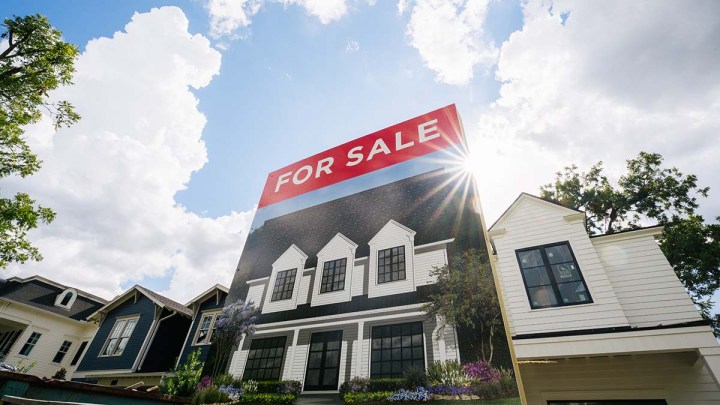
Housing price trends are split down the middle of the country
Housing price trends are split down the middle of the country

Housing trends are often highly regional stories, but the current data is painting more of a national picture. All 12 of the major housing markets west of Texas, with the addition of Austin, saw home prices decrease this January compared to January 2022. In contrast, home prices did the opposite and rose year over year in the 37 biggest markets east of Colorado.
That forms a price split practically down the center of America.
LaTisha Grant is the executive managing broker at TAS Realty Group in Houston, which is practically on the fault line of this divide. Grant joined Marketplace’s Amy Scott to talk about what she’s hearing from buyers and sellers in her area. The following is an edited transcript of their conversation.
Amy Scott: How would you describe the Houston market right now?
LaTisha Grant: Oh, my goodness. So we are at a very interesting point where prices are starting to decline and buyers are now getting back into the market in many of our areas.
Scott: Well, that’s maybe good. I mean, you had been kind of waiting for things to cool off enough to be, to make housing more affordable for a lot of your clients. Is that happening even with higher interest rates?
Grant: We absolutely have been waiting a very long time, like, we’ve been waiting since the pandemic. And you know, for real estate, six months is a long time, so imagine two years. We’ve been struggling. Our poor buyers. Many of them renew their lease for a minimum of a year. And now they’re at a place where they can get back into the market, and they’re entering.
Scott: As I mentioned, we’re seeing kind of an unusual split in the housing market: east versus west. Where do you see Houston falling? You said prices have been cooling a little bit?
Grant: Yes. So even for our lower-end buyers, we have not seen prices below the $240,000-250,000 price mark. However, today, I have a buyer that’s been approved for $195,000. Now, had this been six months ago, we would not have even been able to find her a home. But I’ve had the opportunity here recently to show her 10 homes, several of which have been on the market for about 60 days.
Scott: So, not flying off the shelves the way they were just a year ago, really.
Grant: That is correct. It has drastically changed. For the buyer, it’s drastically changed for the better. For the sellers, it is not so much changed for the better. Now they’re having to deal with, “Oh my goodness, we have to actually entertain doing repairs, we have to entertain, maybe, paying buyers’ closing costs.” Now, I will say, though, in some of our markets, that’s not exactly the case. So our lower-end groups, you know, that may be utilizing down-payment assistance, the sellers are entertaining it — but our middle-income [buyers], they are moving a little faster.
Scott: What kinds of conversations are you having with clients now that mortgage rates have been kind of volatile lately, with the recent bank failures and uncertainty about the future of lending in this economy?
Grant: Now, my conversations may be a little different than your second buyer or your move-up buyer, but many of my buyers are coming from renting. And I don’t know anything more volatile than the rental market. So that is the conversation. But just in general, you know, interest rates are what they are. And at the time that you’re ready to purchase a home, interest rates could be 5%, they could be 6%, they could be 7%. When my mom bought her home, interest rates were 13%. However, what I will say for certain is if homeownership is of interest to you, and you can afford to purchase a home, you cannot allow an interest rate to stop you from purchasing that home. You pay 100% interest rate when you’re a renter. So, you know, to hear a 6% or 7%, well, you know, we’re not really used to a 3% or 4% interest rate market. That’s really something that was uncommon. And it just kind of came and just as fast as it comes, it’s going to leave.
Scott: Right, we have to remember that that was a historical anomaly, but we got kind of used to it. So here we are talking in late March — spring and summer, the market typically does pick up and there are typically more listings this time of year. But there’s a lot of talk that people who own houses and bought their house with a really low mortgage rate or refinanced into a really low mortgage rate may be reluctant to sell. I mean, do you expect that typical pattern to happen this summer with more listings coming on?
Grant: I don’t. I’ve had conversations with several sellers wanting to sell their home and buy a new home, and they honestly cannot get what they purchased for what they are paying currently. So they’re a little more reluctant to sell. Now, as far as it relates to Houston, with the amount of vacant land that we have, we are so fortunate in that that we can just look at our builders to build more.
There’s a lot happening in the world. Through it all, Marketplace is here for you.
You rely on Marketplace to break down the world’s events and tell you how it affects you in a fact-based, approachable way. We rely on your financial support to keep making that possible.
Your donation today powers the independent journalism that you rely on. For just $5/month, you can help sustain Marketplace so we can keep reporting on the things that matter to you.

















